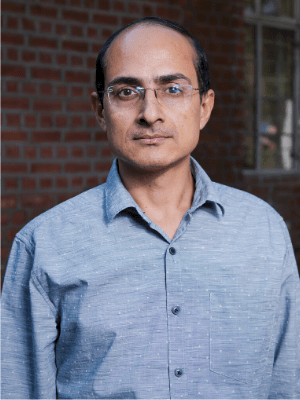Room 019, School of Engineering and Applied Science


Neel Kamal Chapagain, Associate Professor and Director, Centre for Heritage Management, Ahmedabad University, spoke with Rahul Mehrotra, Founder Principal, RMA Architects, and Professor of Urban Design and Planning and the John T Dunlop Professor in Housing and Urbanization, Graduate School of Design, Harvard University. The engaging discussion revolved on acknowledging the transient nature of structures around us. Mr Mehrotra defined context as a combination of the most tangible things - climate, labour practices, the direction of the wind, and how sunlight falls to intangible effects of finding hidden histories of the land. This blend of tangible and intangible gives us a nuanced way of thinking about architecture. He spoke of how discovering hidden histories through the notion of 'context of the context' and understanding the socio-cultural and political archives of the people and the surroundings is essential because architecture has to be in conjunction with the population occupying them.
Another theme that presented itself during the talk was the responsibility of an architect in managing the expectations of various stakeholders: patron-client, operational workers, and the users. The patron-client has the capital to design a structure; the operational workers are the field architects who work on the design; and finally, the users will use the final product. He illustrated that it is easier to manage expectations in a smaller setting like weekend homes; while designing an institution, finding a perfect balance between the three is significantly more critical.
Rahul Mehrotra is the founder principal of RMA Architects. He divides his time between working in Mumbai and Boston and teaching at the Graduate School of Design at Harvard University, where he is a Professor of Urban Design and Planning and the John T. Dunlop Professor in Housing and Urbanization. From 2012-2015, he led a Harvard University-wide research project called The Kumbh Mela: Mapping the Ephemeral Mega City. This work was published as a book in 2014. This research was extended in 2017 in the form of a book titled Does Permanence Matter? Mehrotra’s most recent books are titled Working in Mumbai (2020), The Kinetic City, and other essays (2021). The former reflects how his practice evolved through its association with the city of Bombay/Mumbai. The second book presents Mehrotra’s writings over the last thirty years and illustrates his long-term engagement with and analysis of urbanism in India. This work has given rise to a new conceptualization of the city, which Mehrotra calls the Kinetic City.
Professor Neel Kamal Chapagain is an Associate Professor and Director, Centre for Heritage Management. He obtained his PhD from the University of Wisconsin-Milwaukee (USA). He also has an Architecture Doctorate and Graduate Certificate in Historic Preservation from the University of Hawaii at Manoa (USA), a professional conservation course at ICCROM in Italy, and a Bachelor of Architecture from the Institute of Engineering, Tribhuvan University, Nepal.